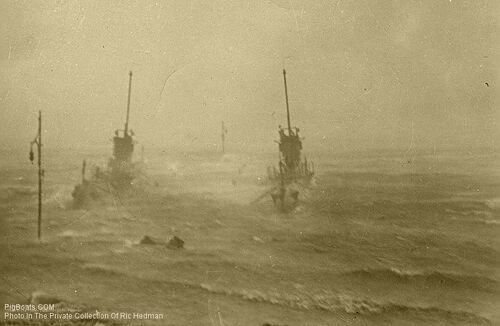Storm: Difference between revisions
Created page with "Category:The Men File:Header 4 New.jpg File:Red bar sub new.jpg === <big>The R-4 in a storm 1938</big> === <div style="text-align: justify;"><span style="color:#00008B"> |left|thumb|300px|<center>The R-4 in a storm</center> <div style="text-align: justify;"><span style="color:#00008B"> This photo was taken September 21, 1938 at Sub Base, Groton, Ct. The Left hand sub is unidentified but the right hand sub is the USS R-4. The 1938 hu..." |
Pbcjohnston (talk | contribs) Corrected format |
||
| Line 4: | Line 4: | ||
=== <big>The R-4 in a storm 1938</big> === | === <big>The R-4 in a storm 1938</big> === | ||
<div style="text-align: justify;"><span style="color:#00008B"> | <div style="text-align: justify;"><span style="color:#00008B"> | ||
[[File:R-4 storm2.jpg | [[File:R-4 storm2.jpg |left|500px|<center>The R-4 in a storm</center>]] | ||
<div style="text-align: justify;"><span style="color:#00008B"> | <div style="text-align: justify;"><span style="color:#00008B"> | ||
This photo was taken September 21, 1938 at | This photo was taken September 21, 1938 at Submarine Base New London, Groton, CT. The sub on the left is unidentified but the right hand sub is the USS R-4. | ||
The 1938 hurricane sent so much water up the Thames River that the pier these two boats were moored to was submerged by the tide. You can see the mooring lines from the boats to the dock going into the water. Between the two submarines a light | The 1938 hurricane sent so much water up the Thames River that the pier these two boats were moored to was submerged by the tide. You can see the mooring lines from the boats to the dock going into the water. Between the two submarines a light stanchion, like the one in the left foreground, is attached to the end of the dock that is underwater. | ||
The hurricane made landfall in Suffolk County on Long Island, New York on September 21, 1938 as a strong Category 3 hurricane on the present-day Saffir-Simpson Hurricane Scale with a central pressure of 946 mbar (hPa).It then traveled across Long Island Sound into Connecticut, Rhode Island, Massachusetts, New Hampshire, Vermont, and finally into Canada while still moving at an unusually high speed. | The hurricane made landfall in Suffolk County on Long Island, New York on September 21, 1938 as a strong Category 3 hurricane on the present-day Saffir-Simpson Hurricane Scale with a central pressure of 946 mbar (hPa). It then traveled across Long Island Sound into Connecticut, Rhode Island, Massachusetts, New Hampshire, Vermont, and finally into Canada while still moving at an unusually high speed. | ||
The hurricane hit Long Island around 3:30 p.m., which was just a few hours before astronomical high tide. At this time the eye was about 50 miles across and the hurricane was about 500 miles wide. | The hurricane hit Long Island around 3:30 p.m., which was just a few hours before astronomical high tide. At this time the eye was about 50 miles across and the hurricane was about 500 miles wide. | ||
| Line 17: | Line 17: | ||
New London was first swept by the winds and storm surge; then the waterfront business district caught fire and burned out of control for 10 hours. Stately homes along Ocean Beach were leveled by the storm surge. The permanently anchored 240-ton lightship at the head of New London Harbor was found on a sand bar two miles away. | New London was first swept by the winds and storm surge; then the waterfront business district caught fire and burned out of control for 10 hours. Stately homes along Ocean Beach were leveled by the storm surge. The permanently anchored 240-ton lightship at the head of New London Harbor was found on a sand bar two miles away. | ||
Photo from the private collection of Ric Hedman | <small>Photo from the private collection of Ric Hedman.</small> | ||
</div> | </div> | ||
Revision as of 02:39, 11 September 2024
The R-4 in a storm 1938

This photo was taken September 21, 1938 at Submarine Base New London, Groton, CT. The sub on the left is unidentified but the right hand sub is the USS R-4.
The 1938 hurricane sent so much water up the Thames River that the pier these two boats were moored to was submerged by the tide. You can see the mooring lines from the boats to the dock going into the water. Between the two submarines a light stanchion, like the one in the left foreground, is attached to the end of the dock that is underwater.
The hurricane made landfall in Suffolk County on Long Island, New York on September 21, 1938 as a strong Category 3 hurricane on the present-day Saffir-Simpson Hurricane Scale with a central pressure of 946 mbar (hPa). It then traveled across Long Island Sound into Connecticut, Rhode Island, Massachusetts, New Hampshire, Vermont, and finally into Canada while still moving at an unusually high speed.
The hurricane hit Long Island around 3:30 p.m., which was just a few hours before astronomical high tide. At this time the eye was about 50 miles across and the hurricane was about 500 miles wide.
New London was first swept by the winds and storm surge; then the waterfront business district caught fire and burned out of control for 10 hours. Stately homes along Ocean Beach were leveled by the storm surge. The permanently anchored 240-ton lightship at the head of New London Harbor was found on a sand bar two miles away.
Photo from the private collection of Ric Hedman.
Page created by:
Ric Hedman & David Johnston
1999 - 2023 - PigBoats.COM©
Mountlake Terrace, WA, Norfolk, VA
webmaster at pigboats dot com
